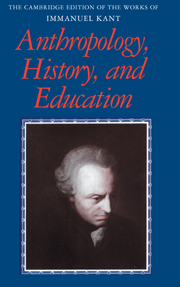Book contents
- Frontmatter
- Contents
- General editors' preface
- Preface
- General introduction
- 1 Observations on the feeling of the beautiful and sublime (1764)
- 2 Essay on the maladies of the head (1764)
- 3 Review of Moscati's work Of the corporeal essential differences between the structure of animals and humans (1771)
- 4 Of the different races of human beings (1775)
- 5 Essays regarding the Philanthropinum (1776/1777)
- 6 A note to physicians (1782)
- 7 Idea for a universal history with a cosmopolitan aim (1784)
- 8 Review of J. G. Herder's Ideas for the philosophy of the history of humanity. Parts 1 and 2 (1785)
- 9 Determination of the concept of a human race (1785)
- 10 Conjectural beginning of human history (1786)
- 11 Some remarks on Ludwig Heinrich Jakob's Examination of Mendelssohn's Morning hours (1786)
- 12 On the philosophers' medicine of the body (1786)
- 13 On the use of teleological principles in philosophy (1788)
- 14 From Soemmerring's On the organ of the soul (1796)
- 15 Anthropology from a pragmatic point of view (1798)
- 16 Postscript to Christian Gottlieb Mielcke's Lithuanian–German and German–Lithuanian dictionary (1800)
- 17 Lectures on pedagogy (1803)
- Editorial notes
- Glossary
- Bibliography
- Index
4 - Of the different races of human beings (1775)
Published online by Cambridge University Press: 05 May 2013
- Frontmatter
- Contents
- General editors' preface
- Preface
- General introduction
- 1 Observations on the feeling of the beautiful and sublime (1764)
- 2 Essay on the maladies of the head (1764)
- 3 Review of Moscati's work Of the corporeal essential differences between the structure of animals and humans (1771)
- 4 Of the different races of human beings (1775)
- 5 Essays regarding the Philanthropinum (1776/1777)
- 6 A note to physicians (1782)
- 7 Idea for a universal history with a cosmopolitan aim (1784)
- 8 Review of J. G. Herder's Ideas for the philosophy of the history of humanity. Parts 1 and 2 (1785)
- 9 Determination of the concept of a human race (1785)
- 10 Conjectural beginning of human history (1786)
- 11 Some remarks on Ludwig Heinrich Jakob's Examination of Mendelssohn's Morning hours (1786)
- 12 On the philosophers' medicine of the body (1786)
- 13 On the use of teleological principles in philosophy (1788)
- 14 From Soemmerring's On the organ of the soul (1796)
- 15 Anthropology from a pragmatic point of view (1798)
- 16 Postscript to Christian Gottlieb Mielcke's Lithuanian–German and German–Lithuanian dictionary (1800)
- 17 Lectures on pedagogy (1803)
- Editorial notes
- Glossary
- Bibliography
- Index
Summary
EDITOR'S INTRODUCTION
Beginning with the summer semester of 1756, which was only his second semester of academic teaching, Kant regularly lectured on physical geography, thereby introducing this subject matter into the curriculum at the University of Königsberg. He offered the course some forty-eight times and, after adding a regular course on anthropology, which was also an academic novelty, beginning with the winter semester 1772/73, alternated between the two courses, lecturing on anthropology during the winter and on physical geography during the summer term. The two-part sequence of courses was designed to give Kant's students useful orientation about the two main fields of knowledge that have an immediate application outside of academia in life, the human being and nature. The course on physical geography was unusual in that Kant did not base it on an official textbook, as was generally required at Prussian universities at the time, but on his own collection of materials to which he added over the years.
On five separate occasions Kant published announcements of his lecture activity for a given semester in the form of a small scholarly essay of wider interest, followed by details about his courses and also including mention or description of his course on physical geography. The last of these invitational writings, dating from the summer semester of 1775, is entitled, Von den verschiedenen Racen der Menschen zur Ankündigung der Vorlesungen der physischen Geographie im Sommerhalbenjahre 1775 von Immanuel Kant der Log. und Met. ordentl. Prof.
- Type
- Chapter
- Information
- Anthropology, History, and Education , pp. 82 - 97Publisher: Cambridge University PressPrint publication year: 2007
- 7
- Cited by

